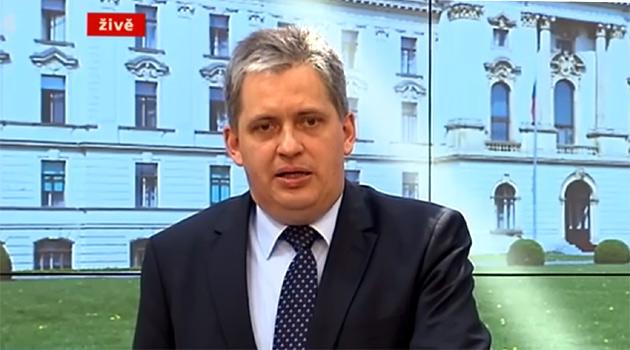Czech Human Rights Minister: Schools must educate Czech and Romani children together

Czech Minister for Human Rights, Equal Opportunities and Legislation Jiří Dienstbier has expressed appreciation for the activities of Amnesty International (AI) in pointing out problem areas and weak spots in the education of Romani children in the country’s schools. "Understandably we are aware of the vast majority of the problem areas mentioned and we see this report as a confirmation of the fact that it is necessary to find appropriate measures to correct them," he said in his reaction to the AI report.
Dienstbier said he considers the report important feedback and that he and his colleagues are committed to addressing it. On Wednesday 22 April Dienstbier met together with Czech Prime Minister Bohuslav Sobotka and AI Secretary-General Salil Shetty to discuss the issue.
During the meeting, Shetty presented the findings and recommendations flowing from AI’s research into unequal access to education. The report is based on research conducted in Brno, České Budějovice, Děčín, Ostrava and Ústí nad Labem.
Czech Human Rights Minister’s Statement on the Amnesty International Report on Unequal Access to Education
"Understandably we are aware of the vast majority of the problem areas mentioned and we see this report as a confirmation of the fact that it is necessary to find appropriate measures to correct them. We are in dialogue with the relevant ministries and calling for change. We have written, and the Government has approved, the Romani Integration Strategy to 2020 which, like the Amnesty International report, points out weak spots in the education of pupils with specific needs and agrees with its recommendations in many respects. As an example, I would mention three key areas that the report refers to. These are the indirect representation of Romani children in the ‘practical schools’, the segregation of such pupils within mainstream classes, and other forms of unequal behavior and treatment of Romani children in schools attended by both non-Romani and Romani children. It is important to mention that we are not just pointing out the issue of assigning Romani children to the so-called ‘practical schools’, which the Ministry of Education, Youth and Sport developed a plan to address in 2012 in order to execute the judgment of D. H. and Others versus Czech Republic and to which the most recent amendment to the Schools Act responds, but that these proposed measures go much further. One measure addresses the situation of the so-called segregated schools. Through the Romani Integration Strategy the Government has pledged to address this area in particular as well as others. The Ministry of Education, Youth and Sport, in collaboration with the Ministry of the Interior, the Czech Government Inter-ministerial Commission on Roma Community Affairs, and the Regional Coordinators for Romani Affairs are supposed to produce, by the end of this year, an analysis of how schools with higher numbers of Romani children (or other ethnic and national minority children) have come into being. At the same time, they have been tasked with applying measures to stop the creation of so-called segregated schools and gradually transforming the so-called Romani schools into inclusive ones," the minister said.
These proposals should be reflected, for example, in the Action Plan for Inclusive Education for 2016-2018. The proposed measures (which have yet to be approved) would aim to fulfill the legal prerequisites for inclusive education per se as well as specific aims with respect to the inclusion of Romani children and pupils in education.
Dienstbier’s team has recommended that legislative and other measures expressly instruct that the desegregation of the Czech schools must be undertaken. It is, therefore, appropriate to undertake a review of the current distribution of school districts with the aim of evaluating whether they facilitate ethnic segregation in the schools.
At the same time, his team has recommended that the schools unequivocally deal with manifestations of prejudice and racism in the schools. Here the introduction of professional standards for teachers must be considered that would include requiring the principle of equal treatment of persons who are of a different ethnic origin.
Guidelines with respect to the enrollment of the children residing in a school’s catchment area might also be effective in this respect. Currently it is necessary to adopt a methodological instruction that will aid schools with defining the unacceptable behaviors and speech that constitute bullying, discrimination, or racially-motivated intimidation.
Schools should receive a manual on how to respond to such cases. Practices used abroad – for example, in the Finnish schools – may be used as an example in this respect.
High-quality audits and evaluation of such measures must be integral components of them. It is, therefore, proposed that the Czech School Inspectorate audit and collect data according to indicators of disability, ethnicity, and sex in order to assess the execution and actual impact of legal regulations and other steps taken to support inclusive education.
"There is no doubt, however, that it is clear that proposed measures are one thing and what happens in practice is another. We are encountering a certain type of education that has developed over decades, as well as the growth of segregation in education as a consequence of the creation and growth of socially excluded localities. It is necessary to work with educators, with non-Romani and Romani parents of schoolchildren, and with public opinion. This is a complex problem that has been ignored for years and no one will be able to solve it in one year," warns Dienstbier.